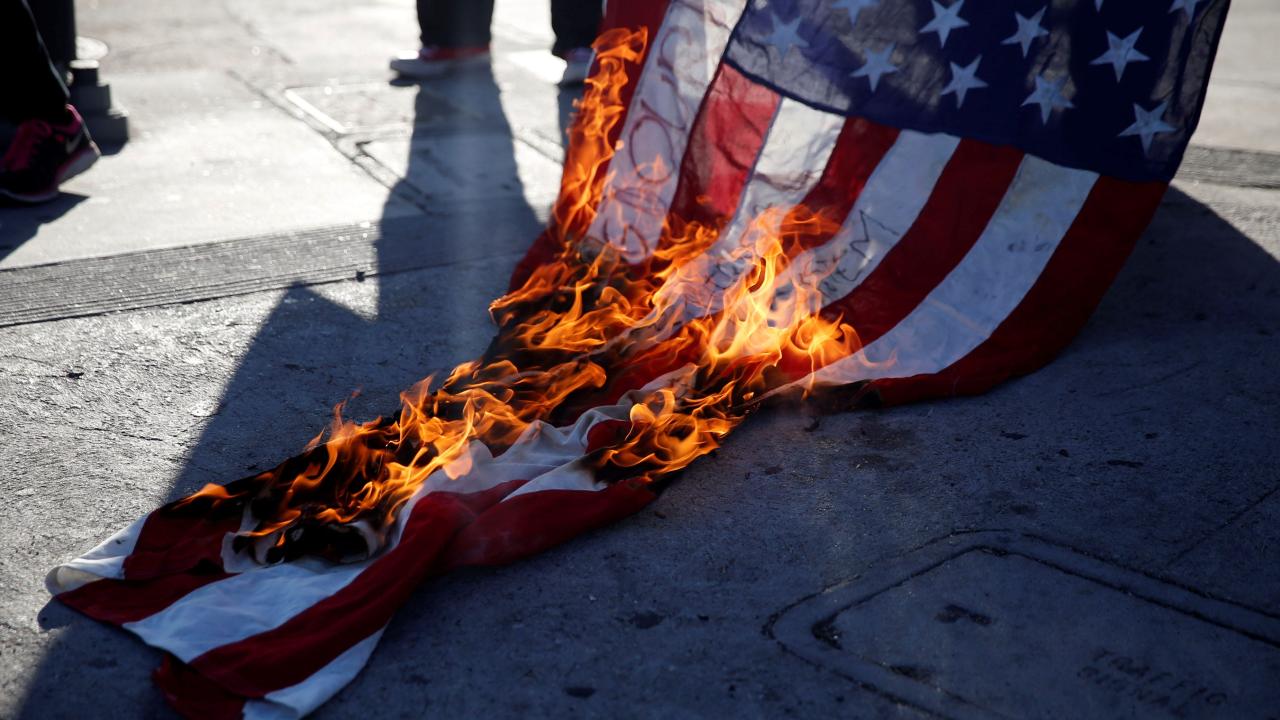
Burning the American Flag: The First Amendment, Symbolism, and the Right to Dissent
The American flag, a revered symbol of national pride and unity, evokes strong emotions in the hearts of Americans. However, the legality of burning the flag has been a subject of intense debate and controversy, raising profound questions about freedom of speech, symbolic expression, and the boundaries of patriotism.
The First Amendment and Symbolic Speech
The First Amendment to the United States Constitution guarantees the right to freedom of speech, which includes the right to express one’s ideas and beliefs through symbolic actions. Burning the American flag is considered a form of symbolic speech, a form of expression that conveys a message through actions or objects rather than words.
In 1969, the Supreme Court ruled in the landmark case of Street v. New York that burning the American flag was protected by the First Amendment. The Court held that "the government may not prohibit the expression of an idea because society finds the idea itself offensive or disagreeable."
The Court recognized that burning the flag is a highly expressive act that can convey a wide range of messages, including political protest, dissent, and social commentary. Prohibiting such acts would have a significant chilling effect on free speech, preventing individuals from expressing their views through symbolic actions.
The Competing Interests of Patriotism and Dissent
Burning the American flag is often perceived as an act of disrespect or desecration, particularly by those who view the flag as a sacred symbol of national unity. However, the First Amendment protects even unpopular or offensive speech, as long as it does not incite imminent violence or unlawful activity.
The First Amendment also recognizes the importance of dissent and protest in a democratic society. Burning the flag can be a powerful way to express disagreement with government policies or social norms. While some may find such actions offensive, they are nonetheless protected by the Constitution’s guarantee of free speech.
Balancing Symbolism and Freedom of Expression
Balancing the symbolic value of the American flag with the right to free speech is a complex task. The Supreme Court has held that certain forms of flag burning may be restricted, such as when it is done in a manner that is likely to incite violence or disorder.
However, the Court has generally struck down laws that prohibit flag burning outright. In 1989, the Court ruled in Texas v. Johnson that a state law criminalizing the burning of the American flag was unconstitutional.
The Court held that "if there is a bedrock principle underlying the First Amendment, it is that the government may not prohibit the expression of an idea because society finds the idea itself offensive or disagreeable."
Controversy and Public Opinion
Despite the Supreme Court’s rulings, the legality of burning the American flag remains a controversial issue. Many Americans view such acts as disrespectful and unpatriotic. Others argue that the First Amendment protects even offensive or unpopular speech, and that burning the flag is a legitimate form of protest.
Public opinion on flag burning is mixed. According to a 2019 Pew Research Center survey, 55% of Americans believe that burning the American flag should be a crime, while 43% believe it should be legal.
Conclusion
The legality of burning the American flag is a complex and controversial issue that has been debated for decades. The Supreme Court has consistently held that such acts are protected by the First Amendment, which guarantees freedom of speech and the right to express one’s views through symbolic actions.
Balancing the symbolic value of the American flag with the right to free expression is an ongoing challenge. However, the First Amendment remains a bulwark against government censorship and protects the right of individuals to express their views, even through unpopular or offensive means.
FAQ
1. Is it illegal to burn the American flag in all 50 states?
No. The Supreme Court has ruled that burning the American flag is protected by the First Amendment, and no state may prohibit it outright. However, some states have laws that restrict flag burning in certain circumstances, such as when it is done in a manner that is likely to incite violence or disorder.
2. Why is it important to protect the right to burn the American flag?
The First Amendment protects all forms of speech, even speech that is unpopular or offensive. Burning the flag is a form of symbolic expression that can convey a wide range of messages, including political protest, dissent, and social commentary. Prohibiting such acts would have a significant chilling effect on free speech, preventing individuals from expressing their views through symbolic actions.
3. What are the arguments against burning the American flag?
Some people argue that burning the American flag is disrespectful and unpatriotic. They believe that the flag is a sacred symbol of national unity and that burning it should be a crime. Others argue that flag burning is protected by the First Amendment and that the government should not be able to prohibit it.
4. How has the Supreme Court ruled on flag burning?
The Supreme Court has ruled twice on the issue of flag burning. In 1969, the Court ruled in Street v. New York that burning the American flag was protected by the First Amendment. In 1989, the Court ruled in Texas v. Johnson that a state law criminalizing the burning of the American flag was unconstitutional.
References
- Street v. New York, 394 U.S. 576 (1969)
- Texas v. Johnson, 491 U.S. 397 (1989)
- Pew Research Center, "Public Opinion on Flag Burning" (2019)
- American Civil Liberties Union, "The Right to Burn the American Flag"
- First Amendment Center, "Burning the Flag: A First Amendment Right"





